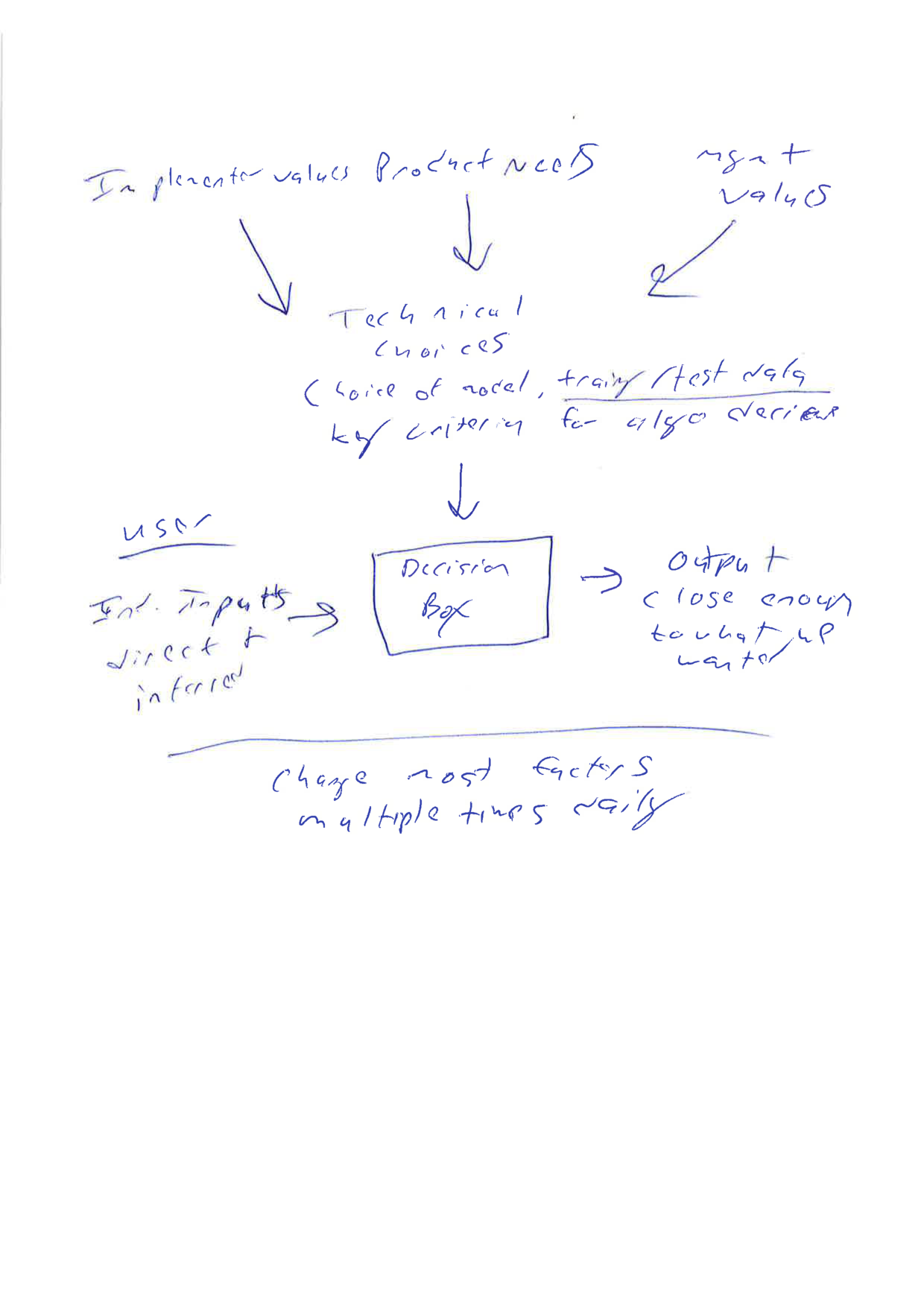An algorithm, drawn by a 33-year-old PhD student in communications studying algorithms who did not identify as either male or female in Denmark.

Can you draw how an algorithm works? That's a big question and not asked by a lot of people. Any algorithm? Mhm. So, let's start on the design level. Product needs and what I will call management values and implementation values, implementer values. I argue that all of these shape technical choices. Arrows here is just shape basically. Choices and that comes down to...I mean, most algorithms are based on some standing algorithmic formula at this point. Like we put a big system together so like, choice of model. Which sadly, comes down to a linear regression most of the time. Choice of model, training, testing data, key criteria or other algo decision. What is this? Key criteria. Criteria! For algo decisions, okay. The product needs theoretically shape this with management's values really being the biggest influence but the more and more I talk to people internally at companies like Facebook the more and more I am certain that a good deal of the engineers are imprinting their own values on this. Sometimes in direct opposition to management. I heard some interesting things from the adds team lately about them being asked to do things they don't want to do and then. Well, technically doing them but not quite. So all of that...I should have put this to the side. So all of that shapes the training data you're going to use, the test data you're going to use and that whole process ultimately generates what I would call the decision box. Which we generally represent as a black box but it's a it's...It's a semi-translucent box to some people but not to the average user. Could be if people put a lot of effort in but like, they have stuff to do. So then, you got... What does that say? Individual input, direct and inferred. And that's basically, that's your user side stuff. So you got them actually making decisions. And then you got all the other stuff the algorithm is roping in. Test data, all that kind of thing. That goes in, all this kind of triggers all of this, it makes a decision, roughly the way these people would hope but hmmm...Usually not a hundred percent. I don't think anyone truly has a handle on what their complex algorithm is doing at this point. I think that's actually potentially a limit of human comprehension. And you get some kind of output. Close enough to what we wanted. Not usually what we wanted, but close enough to what we wanted. And then the important thing. The important thing that I think we screw up when we teach algorithms is the idea that this will do the same thing with the same criteria every single time. Which is true in a world where you program an algorithm and never update it and therefore not true in any facet of our current world. Unless you are using an already broken system, right? And I think this is part of what screws people up when we do, even when we do stuff that's really basic computational literacy. We give them that lesson and then that sounds really easy and really simple. I got to figure this out once - I am done. Except no. Facebook in particular is going to change this ten times today... So this is change most factors? Multiple times daily. So it is something that should be consistent, but isn't consistent. Okay. Are these open pens? Is this an open pen or is this a letter? That's a C. Oh, it's a C. Choice of model. Technical choice and this is? Close enough. Close enough! Oh okay, thank you. Yeah. Okay. Great. Where did you first hear the term algorithm? Probably from my dad when I was a kid? He did, that is kind of how he got himself out of a kind of bad early life. He learned computers in the Seventies and that turned out kind of a good thing to know in the Eighties and Nineties. So, he kind of made sure I knew a lot of computational stuff because he started doing that as - this is how you are not poor anymore. Knowing computers. That appears to be true, at least for guys like him. And these days? Where do you hear about it? I mean, that's a lot of my individual research. I don't go to the algorithms, like I don't go to WIST and conferences like that that are more the formal stuff but I do read in those areas. Just to make sure I am not misinterpreting things in my more social work. And you know, it's something I regularly search for. I am very curious when magazines especially write about algorithms, I always try to read those. Because I think it tells me something about the way we are thinking about it culturally, which is impactful for my work.